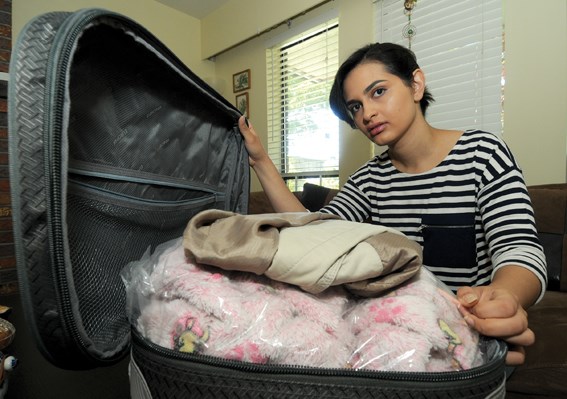Make a wish.
That was the offer made to Carson Graham student Diba Sanatgar. The North Vancouver teen was suffering from a bone cancer called osteosarcoma when a co-ordinator for the Children’s Wish Foundation told her she could travel (the most common choice), meet a favourite celebrity, or own a sought-after item.
Sanatgar wanted something else.
Her wish was to head to New York and meet with officials from Unicef to discuss starting a children’s charity.
“When I got my diagnosis I was really keen to help children who were underprivileged and didn’t have access to free health care like I did,” said Sanatgar, now 17. The trip to New York would have included a tour of the United Nations, and “an opportunity to pursue that dream,” she said.
Sanatgar was initially hoping to hit New York in 2016 but the trip was bumped back a year when not everyone in the family was able to renew their passports and secure visas in time.
“After that the whole travel ban thing was put into place,” Sanatgar noted.
U.S. President Donald Trump’s ban targeted travellers from predominantly Muslim countries, including Iran, where Sanatgar spent her formative years.
“That’s when I found I couldn’t easily go to New York anymore,” she said.
It’s possible the trip to New York might have worked, noted Children’s Wish Foundation provincial director Jennifer Petersen – but it would have been a risk.
“Everybody was a little unsure of what that ban really was,” she said.
That uncertainty came into focus recently when an all-girls Afghan robotics team was only allowed entry into the U.S. after Trump intervened following two rejections of the team’s visa applications.
A recent opinion piece in the New York Times recently noted an increase in administrative hurdles as well as regulations that force visa applicants to supply years of personal data.
Visas issued to travellers from six Muslim majorities – including Iran – recently plunged 55 per cent, according to the piece.
Whenever the wish involves a trip, the Children’s Wish Foundation’s priority is “worry-free” travel, Petersen noted.
Given the obstacle presented by the political climate, the foundation and Sanatgar decided against heading to New York.
The travel ban is frustrating, Sanatgar said.
“Not just because I couldn’t go to New York but because I feel really bad for all the human beings that are discriminated against,” she said.
Having grown up in Mashhad, Iran, Sanatgar and her family came to Canada when she was 14 in pursuit of more freedom, “a better education and a better future.”
Sanatgar was 15 when her leg hurt and kept hurting. An X-ray showed cancer.
But amid chemotherapy treatments and surgeries, Sanatgar may have spotted her career path.
“I was really inspired by my oncologist. She really transformed my life, so I want to do that for other people, too.”
With her cancer in remission, Sanatgar said her health is fine today. One year away from graduating high school, she’s interested in studying genetics and possibly becoming an oncologist.
The Children’s Wish Foundation has a policy of granting requests for children between the ages of three and 17, which means time is running out for Sanatgar to collect her wish.
After a vacation in Fiji was scuttled due to connecting flights all stopping in the United States, she decided on a trip to Greece.
The B.C. and Yukon chapter of the Children’s Wish Foundation grants about 120 wishes each year, according to Petersen.
“I would say one or two per year … are what we call giving wishes,” she said.



